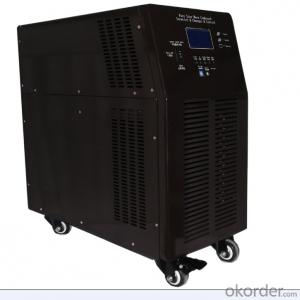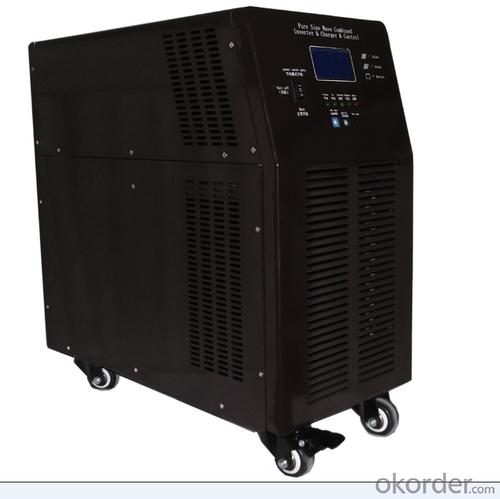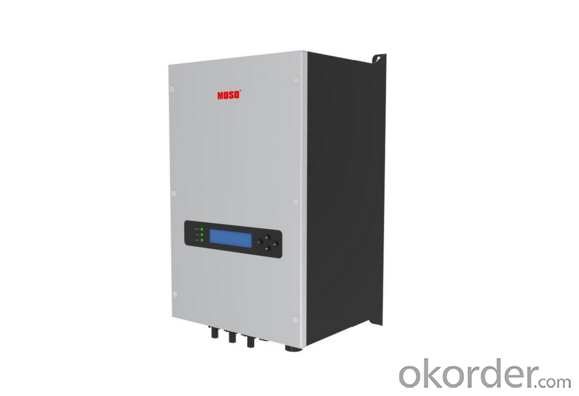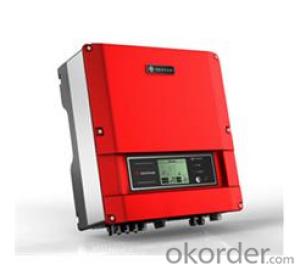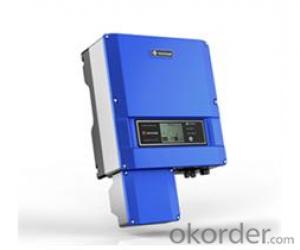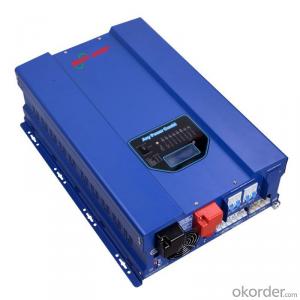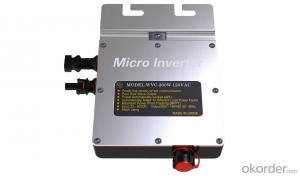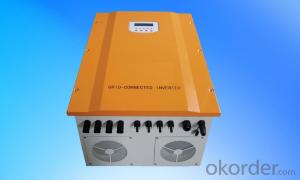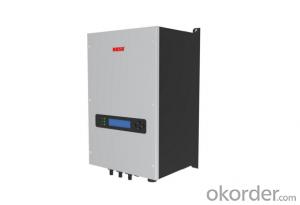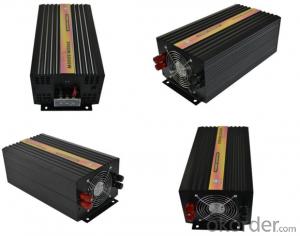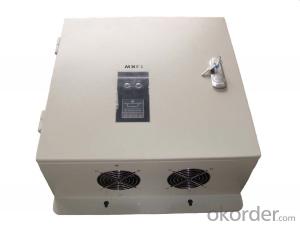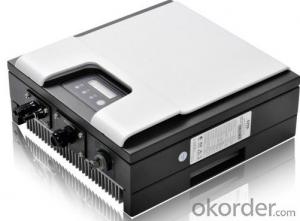Single Phase Inverter Second Generation 1.5k Solar Inverter made in China
- Loading Port:
- Shanghai
- Payment Terms:
- TT OR LC
- Min Order Qty:
- 0 watt
- Supply Capability:
- 10000 watt/month
OKorder Service Pledge
OKorder Financial Service
You Might Also Like
Description of Single Phase Inverter Second Generation 1.5k Solar Inverter
Solar ac power system consists of solar panels, charge controllers, inverter and battery; Solar energy does not include inverter dc power system. Inverter is a kind of power conversion device, inverter by incentives can be divided into self-excited oscillation inverter and separately excited oscillation inverter.
Features of Single Phase Inverter Second Generation 1.5k Solar Inverter
Standard 10 years warranty, 5-15 years optional
Built-in Gprs as option
Built-in Wifi as option
Smaller and lighter, only 9.6kg
High performance DSP for algorithm control
VDE-AR-N 4105 certification
New topology design
Dual MPPT design
Multi-button touch interface
LCD screen visible at night
Have anti-shading function
Advantages of Single Phase Inverter Second Generation 1.5k Solar Inverter
Longer life cycle
Plug and play
Free monitoring through our webportal
Very lower internal temperature
Easy transportation and installation
Faster CPU speed
Adjustable active and reactive power
Maximum conversion effciency up to 97.7%,Euro up to 96.9%
Real-time data readable at night
User friendly operation
Technical Data of Single Phase Inverter Second Generation 1.5k Solar Inverter
| Type | Omniksol-1.5k-TL2 |
| Input(DC) | |
| Max.PV Power | 1750W |
| Max,DC Voltage | 500V |
| Nominal DC Voltage | 360V |
| Operating MPPT Voltage Range | 120-450V |
| MPPT Voltage Range at Nominal Power | 150-450V |
| Start up DC Voltage | 150V |
| Turn off DC Voltage | 120V |
| Max, DC Current | 18A |
| Max, Short Cicuit Current for each MPPT | 20A |
| Number of MPP trackers | 1 |
| Number of DC Connection for each MPPT | 1 |
| DC Connection Type | MC4 connector |
| Output(AC) | |
| Max,AC Apparent Power | 1650VA |
| Nominal AC Power (cos phi = 1) | 1500W |
| Nominal Grid Voltage | 220V/230V/240V |
| Nominal Grid Frequency | 50Hz/60Hz |
| Max, AC Current | 9.0A |
| Grid Voltage Range** | 185-276V |
| Grid Frequency Range** | 45-55Hz/55-65Hz |
| Power Factor | 0.9 capacitive... 0.9 inductive |
| Total Harmonic Distortion(THD) | <2% |
| Feed in Starting Power | 30W |
| Night time Power Consumption | <1W |
| Standby Consumption | 6W |
| AC Connection Type | Plug-in connertor |
| Efficiency | |
| Max,Efficiency | 97.7% |
| Euro Efficiency | 96.8% |
| MPPT Efficiency | 99.9% |
| Safety and Protection | |
| DC Insulation Monitoring | Yes |
| DC Switch | Optional |
| Residual Current Monitoring Unit (RCMU) | Integrated |
| Grid Monitoring with Anti-islanding | Yes |
| Electricity Fuse Protection | Yes |
| Protection Class | Ⅰ(According to IEC 62103) |
| Overvoltage Category | PVⅡ/Mains Ⅲ(According to IEC 62109-1) |
| Reference Standard | |
| Safety Standard | EN 62109, AS/NZS 3100 |
| EMC Standard | EN 6100-6-1, EN 6100-6-2, EN 6100-6-3 EN 6100-6-4, EN 6100-3-2, EN 6100-3-3 |
| Grid Standard | VDE-AR-N4105. VDE-0126-1-1,G83/1,EN 50438,RD1699,CEI 0-21, AS4777,C10/C11 |
| Physical Structure | |
| Dimensions | 343x281x150mm |
| Weight | 9.6kg |
| Environmental Protection Rating | IP 65 (According to IEC 60529) |
| Cooling Concept | Natural convection |
| Mounting Information | Wall bracket |
| General Data | |
| Operating Temperature Range | -25℃ to +60℃(derating above 45℃) |
| Relative Humidity | 0% to 98%, no condensation |
| Max. Altitude (above sea level) | 2000m |
| Noise Type | <40dB |
| Isolation Type | Transformerless |
| Display | 3 LED ,Backlight, 4x20 Character LCD |
| Data Communication | RS485(WiFi, GRPS integrated) |
| Computer Communication | USB |
| Standard Warranty | 10 Years (5-15 years optional) |
IMages of Single Phase Inverter Second Generation 1.5k Solar Inverter
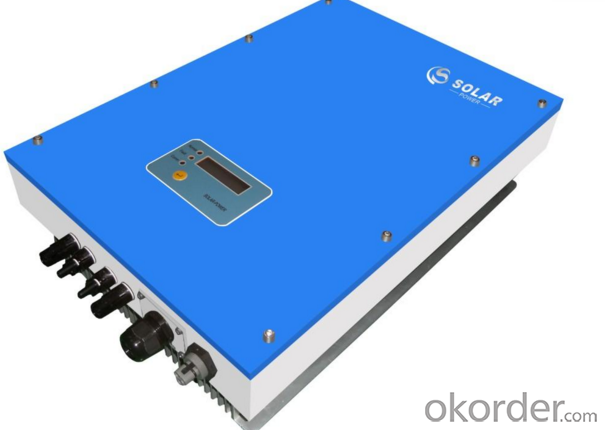
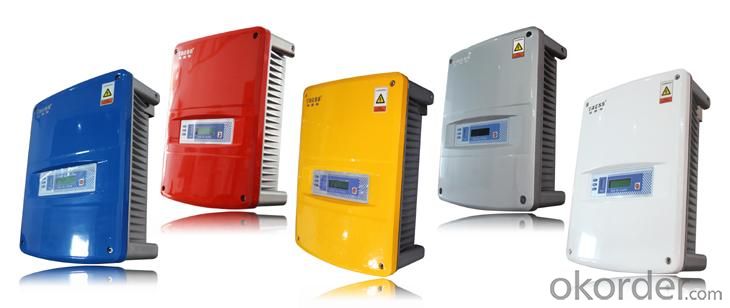
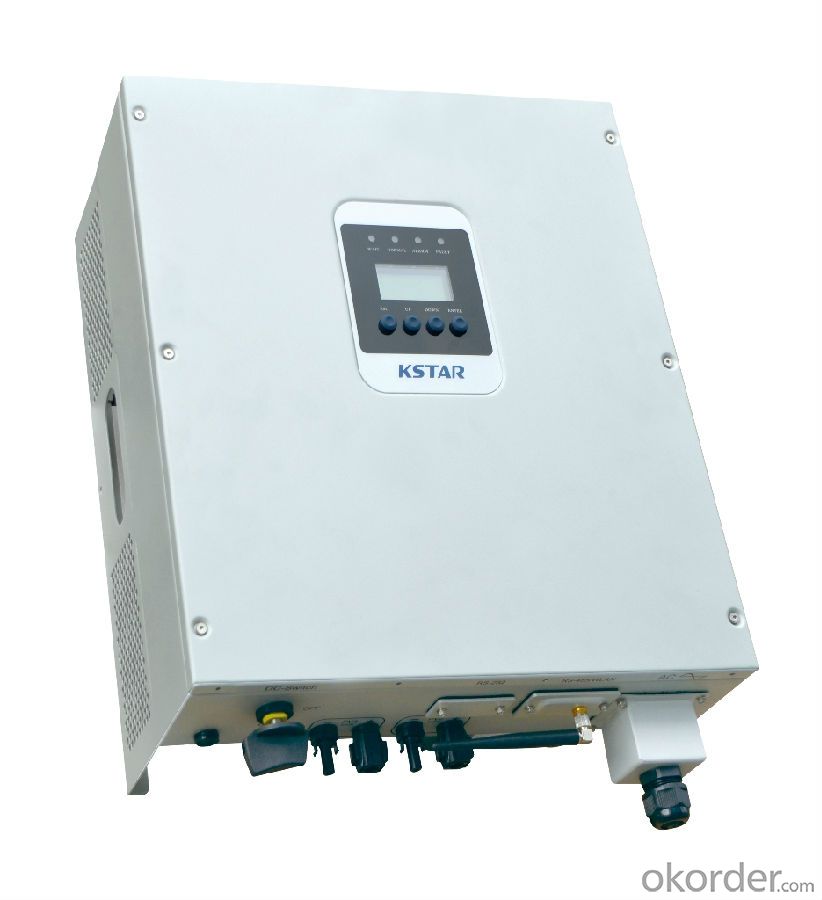
FAQ
Q: Do you have the CE, TUV, UL Certification?
A: We’ve already passed all the tests, and any certificate is available.
Q: Have you ever sold your products to companies in my country?
A: Of course, we have customers in all general PV markets, but I think we should expand our market share along with the market growth.
Q: When did your company set up? You are a new company, how can I believe your quality?
A: We entered into Solar PV industry in 2005, now we have several plants in manufacturing of a-Si and c-Si panels, and our capacity is 220MW per year. Till now we have already passed all the tests by authorized laboratories, e.g. TUV, CE, UL.
Q: Can you help us install the module if we cooperate with you?
A: We haven’t entered into installation sector, but we have the plan in near future.
Q: How do you pack your products?
A: We have rich experience on how to pack the panels to make sure the safety on shipment when it arrives at the destination.
Q: Can you do OEM for us?
A: Yes, we can.
Q: Can we visit your factory?
A: Surely, I will arrange the trip basing on your business schedule.
- Q: Can a solar inverter be used with a solar-powered water pumping system?
- Yes, a solar inverter can be used with a solar-powered water pumping system. The solar inverter converts the direct current (DC) produced by the solar panels into alternating current (AC), which is necessary to power the water pump. By utilizing a solar inverter, the energy generated by the solar panels can be efficiently transferred to the water pumping system, allowing it to operate using clean and renewable energy.
- Q: How does a solar inverter handle varying solar irradiance levels?
- A solar inverter handles varying solar irradiance levels by continuously monitoring the incoming solar power and adjusting its output accordingly. It employs a maximum power point tracking (MPPT) algorithm that optimizes the energy conversion from the solar panels to the desired AC power output. When solar irradiance levels fluctuate, the inverter dynamically adapts to ensure the maximum power is extracted from the solar panels. This allows for efficient energy conversion and maximum utilization of the available solar power.
- Q: Can a solar inverter be used with a battery backup system?
- Yes, a solar inverter can be used with a battery backup system. The solar inverter converts the DC power generated by the solar panels into AC power that can be used to power appliances and charge batteries. The battery backup system stores excess solar energy for use during times when the sun is not shining, providing a reliable source of power even when the solar panels are not producing electricity.
- Q: How does a solar inverter handle power export limitations imposed by the grid?
- A solar inverter handles power export limitations imposed by the grid through a process known as grid-tied or utility interactive operation. It continuously monitors the grid's voltage and frequency, adjusting the power output of the solar system accordingly. If the grid is unable to accept additional power due to export limitations, the inverter will reduce the output of the solar system to ensure compliance with the grid's requirements. This allows for a smooth and safe integration of solar power into the grid, preventing any potential disruptions or overloading.
- Q: Can a solar inverter be used in systems with different module orientations?
- Yes, a solar inverter can be used in systems with different module orientations. Solar inverters are designed to convert the direct current (DC) generated by solar panels into alternating current (AC) for use in homes or businesses. They are compatible with various module orientations, including those that are east-west or south-facing. The inverter's maximum power point tracking (MPPT) technology allows it to optimize energy production regardless of the module orientation, ensuring efficient utilization of solar energy.
- Q: What are the common fault indications in a solar inverter?
- Common fault indications in a solar inverter can include error messages on the display panel, blinking lights, sudden shutdowns or restarts, abnormal noise, overheating, and fluctuations in power output.
- Q: Can a solar inverter be used with a portable solar panel system?
- Yes, a solar inverter can be used with a portable solar panel system. The solar inverter converts the direct current (DC) generated by the portable solar panels into alternating current (AC) that can be used to power various devices or be fed into the electrical grid. This allows for the efficient utilization of the energy generated by the portable solar panel system.
- Q: Can a solar inverter be repaired or replaced if it malfunctions?
- Yes, a solar inverter can be repaired or replaced if it malfunctions. In many cases, minor issues can be resolved through repairs, such as replacing faulty components or fixing wiring problems. However, if the malfunction is severe or the inverter is beyond repair, it may need to be replaced with a new one.
- Q: How does a solar inverter handle voltage rise in case of low load conditions?
- A solar inverter handles voltage rise in case of low load conditions by using a feature called voltage regulation. It continuously monitors the voltage level and adjusts the power output accordingly to prevent any excessive rise in voltage. This helps maintain a stable and safe voltage level, even during low load conditions.
- Q: Can a solar inverter be used in remote areas?
- Yes, a solar inverter can be used in remote areas. Solar inverters are commonly used in off-grid systems to convert the DC power generated by solar panels into AC power that can be used for various applications. These systems are particularly beneficial in remote areas where access to the electricity grid is limited or non-existent. By harnessing solar energy, a solar inverter can provide reliable and sustainable power to remote communities, powering homes, schools, clinics, and other essential infrastructure.
Send your message to us
Single Phase Inverter Second Generation 1.5k Solar Inverter made in China
- Loading Port:
- Shanghai
- Payment Terms:
- TT OR LC
- Min Order Qty:
- 0 watt
- Supply Capability:
- 10000 watt/month
OKorder Service Pledge
OKorder Financial Service
Similar products
Hot products
Hot Searches
Related keywords
